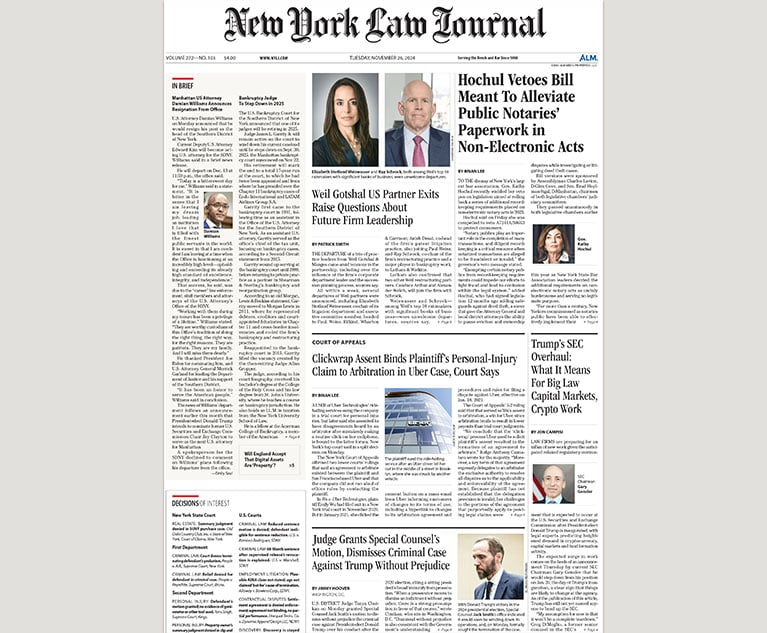 Bob Carlson. Photo: David Handschuh.
Bob Carlson. Photo: David Handschuh. In Bid to Reverse Declining Membership, ABA President Touts New Dues Structure and Focus
"We're trying to figure out a way to meet the evolving need of this profession and the changing needs of the next generation of lawyers," Bob Carlson says.
April 30, 2019 at 02:18 PM
5 minute read
The original version of this story was published on Law.com
The American Bar Association has overhauled its membership structure in a bid to reverse years of declining participation and falling revenue, with the changes going into effect May 1. The change is intended to simplify the complex dues structure, reduce costs for members, and make the association more relevant to attorneys through targeted content. The ABA hopes to have all members renewed under the new structure by September.
ABA leadership signed off on the overhaul last August amid mounting challenges. It has lost about 56,000 dues-paying members in the past 10 years and fewer than 200,000 of its approximately 424,000 members pay dues. Less than 13 percent of the nation's lawyers are dues-paying members. The associations' general budget declined by 22 percent between 2014 and 2018, and last year it projected an additional $15 million annual loss in dues revenue without making changes. The changes are expected to result in short-term financial losses that will recover in time with membership gains.
Annual membership costs will go down for all members, but the savings will be the highest for attorneys in the early stages of their careers. For example, those with five years or less of experience will pay $75 annually, down from between $146 and $250, depending on their experience. All members can access the Law Practice and GP Solo Divisions at no additional cost, but membership to most of the individual sections will cost between $10 and $105 annually. More content on the ABA's website will be restricted to members and members of individual sections, though all members will have access to a library of free CLE courses.
Law.com talked with ABA president Bob Carlson, a partner at Corette Black Carlson & Mickelson in Butte, Montana, about the new structure and why members have been fleeing the group. His answers have been edited for length.
Why do you think ABA membership has been declining? I think that there has been a change across the board with associations—not just the ABA and not just professional associations. We're trying to figure out a way to meet the evolving need of this profession and the changing needs of the next generation of lawyers. It's something we've been looking at for quite a while. We think we've found the right recipe, if you will, to reverse that trend and move forward with a benefits package and membership model that will meet not only the needs of lawyers who have been practicing for 15, 20 years or more, but also those in law school and younger lawyers.
Some critics say membership has been waning because ABA has become too political. What's your response to that? I don't think it has become too political. First, you have to look at where our statements come from. They come from policies that have been developed by our House of Delegates, which has at least three people from each state. We have people in the house who are liberal. We have people who are conservative. Probably most fit into where most people are, which is that middle ground of moderates one way or another.
We do speak out on issues related to due process, the rule of law, an independent judiciary and access to justice. In my mind, those aren't liberal. Those are fundamental rights guaranteed by the Constitution. We're the perfect organization to speak out on those.
Why should people join the ABA? It sort of depends on who you are and what point you are at in your career. I think the selling point is that people need an association that will speak out on behalf of the profession and on behalf of the judiciary. A lot of people go to law school for that very reason and will gravitate towards an association that has that national voice. Second, our association is designed to make you not only a better lawyer, but really a better person and contributor to society. People look for networking and substantive practice information. By and large, people want an association that speaks with a national voice and stands up not just for the legal profession but for the justice system.
What's the strategy to make the ABA more attractive to younger lawyers? Younger lawyers want to give back. They want to make a difference. So we have plenty of coordinated opportunities to allow them to provide pro bono assistance and get involved in activities to help their communities. We also provide the connectivity that allows them to experience a broad base of legal experts in every field. It gives them a way to connect with their peers and lawyers and judges who are exceptional in their fields.
Tomorrow is Law Day, and the ABA has selected free speech as its theme. Why? It's definitely timely. We wanted to make sure we have a dialog across the country to tell people how important it is to have not just free speech but a free press, and inform them about what's going on and encourage a civil dialog among people who may have different views. We want to encourage people to listen to each other and respect each other's freedoms under the Constitution.
This content has been archived. It is available through our partners, LexisNexis® and Bloomberg Law.
To view this content, please continue to their sites.
Not a Lexis Subscriber?
Subscribe Now
Not a Bloomberg Law Subscriber?
Subscribe Now
NOT FOR REPRINT
© 2024 ALM Global, LLC, All Rights Reserved. Request academic re-use from www.copyright.com. All other uses, submit a request to [email protected]. For more information visit Asset & Logo Licensing.
You Might Like
View All
Patent Trolls Come Under Increasing Fire in Federal Courts


Trump's SEC Overhaul: What It Means for Big Law Capital Markets, Crypto Work
Trending Stories
- 1Judge Denies Sean Combs Third Bail Bid, Citing Community Safety
- 2Republican FTC Commissioner: 'The Time for Rulemaking by the Biden-Harris FTC Is Over'
- 3NY Appellate Panel Cites Student's Disciplinary History While Sending Negligence Claim Against School District to Trial
- 4A Meta DIG and Its Nvidia Implications
- 5Deception or Coercion? California Supreme Court Grants Review in Jailhouse Confession Case
Who Got The Work
Michael G. Bongiorno, Andrew Scott Dulberg and Elizabeth E. Driscoll from Wilmer Cutler Pickering Hale and Dorr have stepped in to represent Symbotic Inc., an A.I.-enabled technology platform that focuses on increasing supply chain efficiency, and other defendants in a pending shareholder derivative lawsuit. The case, filed Oct. 2 in Massachusetts District Court by the Brown Law Firm on behalf of Stephen Austen, accuses certain officers and directors of misleading investors in regard to Symbotic's potential for margin growth by failing to disclose that the company was not equipped to timely deploy its systems or manage expenses through project delays. The case, assigned to U.S. District Judge Nathaniel M. Gorton, is 1:24-cv-12522, Austen v. Cohen et al.
Who Got The Work
Edmund Polubinski and Marie Killmond of Davis Polk & Wardwell have entered appearances for data platform software development company MongoDB and other defendants in a pending shareholder derivative lawsuit. The action, filed Oct. 7 in New York Southern District Court by the Brown Law Firm, accuses the company's directors and/or officers of falsely expressing confidence in the company’s restructuring of its sales incentive plan and downplaying the severity of decreases in its upfront commitments. The case is 1:24-cv-07594, Roy v. Ittycheria et al.
Who Got The Work
Amy O. Bruchs and Kurt F. Ellison of Michael Best & Friedrich have entered appearances for Epic Systems Corp. in a pending employment discrimination lawsuit. The suit was filed Sept. 7 in Wisconsin Western District Court by Levine Eisberner LLC and Siri & Glimstad on behalf of a project manager who claims that he was wrongfully terminated after applying for a religious exemption to the defendant's COVID-19 vaccine mandate. The case, assigned to U.S. Magistrate Judge Anita Marie Boor, is 3:24-cv-00630, Secker, Nathan v. Epic Systems Corporation.
Who Got The Work
David X. Sullivan, Thomas J. Finn and Gregory A. Hall from McCarter & English have entered appearances for Sunrun Installation Services in a pending civil rights lawsuit. The complaint was filed Sept. 4 in Connecticut District Court by attorney Robert M. Berke on behalf of former employee George Edward Steins, who was arrested and charged with employing an unregistered home improvement salesperson. The complaint alleges that had Sunrun informed the Connecticut Department of Consumer Protection that the plaintiff's employment had ended in 2017 and that he no longer held Sunrun's home improvement contractor license, he would not have been hit with charges, which were dismissed in May 2024. The case, assigned to U.S. District Judge Jeffrey A. Meyer, is 3:24-cv-01423, Steins v. Sunrun, Inc. et al.
Who Got The Work
Greenberg Traurig shareholder Joshua L. Raskin has entered an appearance for boohoo.com UK Ltd. in a pending patent infringement lawsuit. The suit, filed Sept. 3 in Texas Eastern District Court by Rozier Hardt McDonough on behalf of Alto Dynamics, asserts five patents related to an online shopping platform. The case, assigned to U.S. District Judge Rodney Gilstrap, is 2:24-cv-00719, Alto Dynamics, LLC v. boohoo.com UK Limited.
Featured Firms
Law Offices of Gary Martin Hays & Associates, P.C.
(470) 294-1674
Law Offices of Mark E. Salomone
(857) 444-6468
Smith & Hassler
(713) 739-1250







